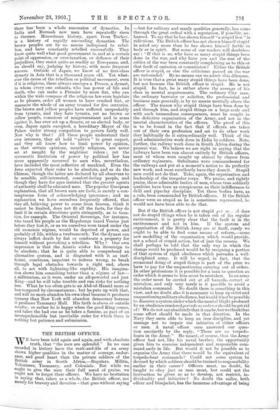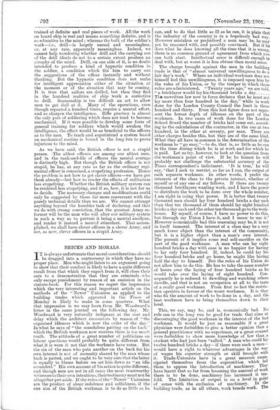THE BRITISH OFFICER.
vE have been told again and again, and with absolute truth, that "the men are splendid." In no case recorded in history have the rank-and-file of an army shown higher qualities in the matter of courage, endur- ance, and good heart than the private soldiers of the British army in South Africa,—Regulars, Militia, Volunteers, Yeomanry, and Colonials. But while we ought to give the men their full meed of praise, we ought not to forget their officers. We have no hesitation in saying that, taken as a whole, the British officer, not Merely for bravery and devotion—that goes without saying —but for military and manly qualities generally, has come through the great ordeal with a reputation, if possible, en- hanced. To say that he has shown himself "a stupid lion" is ridiculous. The British officer has not shown himself stupid in mind any more than he has shown himself feeble in body or in spirit. But some of our readers will doubtless say : If that is so, why have so many stupid things been done in the war, and why have you and the rest of the critics of the war been constantly complaining as to this or that fault of omission or commission ? Either the British officer is stupid, or else the criticisms passed on the war are unfounded.' By no means can we admit this dilemma. It is true that a great many stupid things have been done, but not because the British officer is stupid. He is not stupid. In fact, he is rather above the average of his class in mental acquirements. The ordinary City man, the ordinary barrister or solicitor, the professional and business man generally, is by no means mentally above the officer. The reason why stupid things have been done by and through him, and stupid things on a large scale and with such tremendous consequences, must be sought in the defective organisation of the Army, and not in the mental characteristics of the officers. The proof of this is to be found in the fact that if officers are taken out of their own profession and set to do other work they habitually do it extraordinarily well. Think of the good administrative work done in India by soldiers. Note, further, the railway work done in South Africa during the present war. We believe we are right in saying that the railways have been run almost entirely by British officers, most of whom were caught up almost by chance from ordinary regiments. Subalterns were commandeered for the railways and put at a moment's notice to do perfectly new work, and most excellently have they done it. Stupid men could not do that. Take, again, the organisation and leadership of the irregular corps. We praise, and rightly praise, these admirable bodies of men, whose true soldierly qualities have been as conspicuous as their indifference to drill and pipeclay discipline. Yet these bodies have, as a rule, been commanded by British officers. If the British officer were as stupid as he is sometimes represented, he would not have been able to do that.
But if the British officer is not stupid per se, al does not do stupid things when he is taken out of his regular environment, it is pretty clear that the fault is in the environment and not in him. If the system and organisation of the British Army are at fault, surely we ought to be able to find some means of reform,—some new modelling of the organisation which would provide, not a school of stupid action, but of just the reverse. We shall perhaps be told that the only way in which the change could be produced would be by resigning a portion of that system of rigid obedience which pervades a well- disciplined army. It will be urged, in fact, that the occasional doing of stupid things is part of the price we have to pay for the unquestioning carrying out of orders. In other professions it is possible for a man to question an order which it seems to him must be mistaken. In an army the order must be carried out at all hazards, correct or mistaken, and only very rarely is it possible to avoid a mistaken command. No doubt there is something in this view, and no doubt also it is necessary to keep up strict and unquestioning military obedience, but would it not be possible to discover a system under which the mental blight produced by an obedience renderedperinde ac cadaver should be got rid of? We do not sayabsolutely that it can be,but wethinkthat some effort should be made in that direction. In the Navy they seem able to keep an iron discipline, and yet manage not to impair the initiative of either officers or men. A naval officer once answered our ques- tion succinctly by the reply, "There are no torpedo- boats in the Army." He meant, of course, that the Army officer had not, like his naval brother, the opportunity given him to exercise independent and responsible com- mand early in life. But would it not be possible so to " organise the Army that there would be the equivalent of torpedo-boat commands ? Could not some system be devised by which soldiers should be trained to responsibility earlier in their career ? Officers must, no doubt, be taught to obey just as men must, but could not the instruction be given so as to develop, not restrict, in- dividuality and initiative ? No doubt the sailor, both officer and bluejacket, has the immense advantage of being trained at definite and real pieces of work. All the work on board ship is real and means something definite, and is so educative to the mind ; whereas the bulk of the soldier's work—i.e.; drill—is largely unreal and meaningless,- or, at any rate, apparently meaningless. Indeed, we cannot help wondering whether drill and the carrying out of the drill ideals do not to a certain extent produce an atrophy of the mind. Drill, on one side of it, is no doubt intended to produce a Lind of hypnotic condition in the soldier, a condition which fits him to carry out the suggestions of the officer instantly and without thinking. But the hypnotic condition does not make for intelligent appreciation either of the situation at the moment or of the situation that may be coming. It is true that sailors axe drilled, but then they find in the hundred realities of ship work a corrective to drill. Seamanship is too difficult an art to allow men to get dull at it. Many of the operations, even though repeated a hundred. times, require a mental effort, and so sharpen the intelligence. Rifle practice is almost the only part of soldiering which does not tend to become Mechanical. If it were possible to develop some form of general training for ' soldiers which would awaken the intelligence, the effect would be as beneficial to the officers as to the men. To teach and superintend a system based on mechanical routine is bound in the long run to prove injurious to the mind.
As we have said, the British officer is not a stupid person. -The ablest officers are among our ablest men, and in the rank-and-file of officers the mental average is distinctly high. But though the British officer is not stupid, he has, at any rate as far as the ordinary regi- mental officer is concerned, a stupefying profession. Hence the problem is not how to get clever officers—we have got them already—but how to render the effects of militarism less stupefying.. Whether the British military system can be rendered less stupefying, and if so, how, it is not for us to decide. The necessary changes and modifications could. only be suggested by those far more conversant with the purely technical details than we are. We cannot attempt anything beyond the humbler task of declaring, and that we do with strong conviction, that the greatest Army re- former will be the man who will alter our military system in such a way as to prevent it being a mental anodyne, and render it instead a mental stimulant. That accom- plished, we shall have clever officers in a, clever Army, and not, as now, clever officers in a stupid Army.











































 Previous page
Previous page